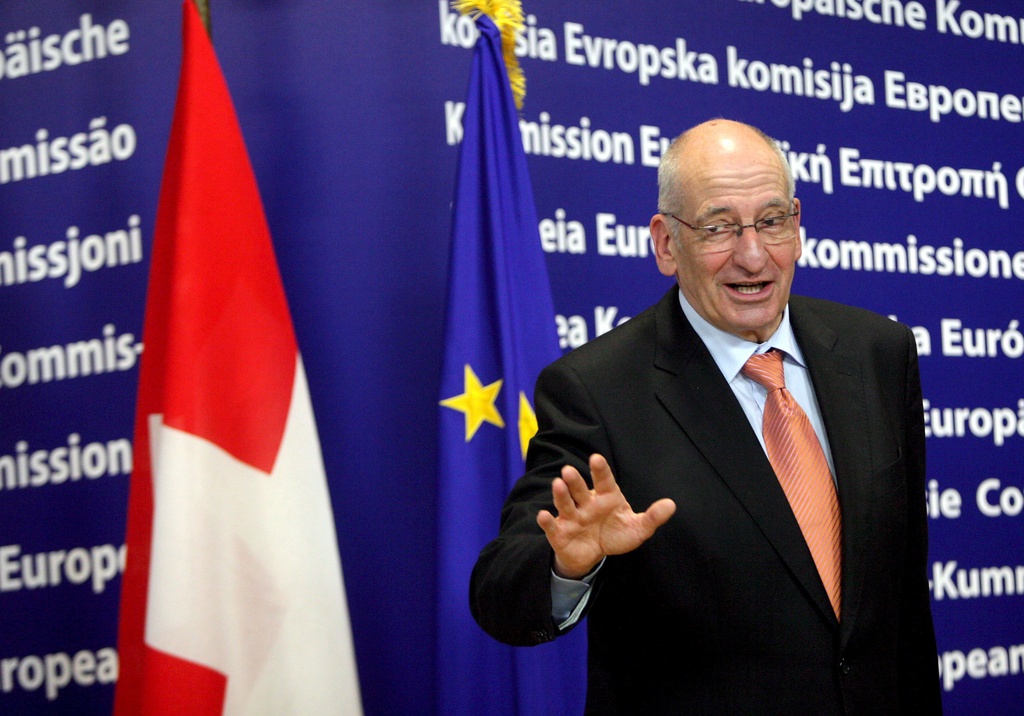Swiss still prefer bilateral accords with EU

Most Swiss continue to back the long-standing system of using bilateral agreements to govern relations between Switzerland and the European Union, according to a representative opinion poll.
Interviews across the country with 1,206 Swiss citizens indicate that the majority believe neither the European Economic Area (EEA) nor EU membership are alternatives to the present bilateral approach.
In the new survey by the gfs.bern polling institute for the Swiss Broadcasting Corporation, 54 per cent of those questioned said the EEA ‘no vote’ had been a good one, while 23 per cent felt it had been a “bad decision”.
Twenty years ago, Swiss voters narrowly turned down the EEA, a half-way house to full EU membership. The Swiss have since become “big fans” of the 120-odd bilateral agreements signed with the 27-nation bloc, gfs.bern chief researcher Claude Longchamp told swissinfo.ch.
People from all shades of the political spectrum share similar feelings about the EEA, he noted. The two centre parties, the Radicals and the Christian Democrats, have shifted their positions on the EEA: in 1992 they backed membership but today are opposed to it.
Since the EEA vote, Swiss citizens have approved to two packages of bilateral accords with the EU (see freeform). Sixty-two per cent of those questioned in the recent poll felt this was the right approach – 66 per cent in French-speaking western Switzerland and 43 per cent in the Italian-speaking south of the country.
“Attitudes towards the EEA and the bilateral accords between the German- and French-speaking regions have become more similar,” said Longchamp. “The so-called Röstigraben [the language and cultural divide between the two regions] has disappeared but differences with the Italian-speaking region remain.”
In 1992 voters from western Switzerland backed joining the EEA, while those in the German-speaking region turned down the idea. Voters from the Italian-speaking region not only rejected the EEA but totally dismissed other EU agreements (bilateral treaties, the Schengen and Dublin accords, aid to eastern Europe, and the free movement of persons accord).
EU entry off the cards
Sixty-three per cent of those questioned said they wanted the government to stay on the bilateral road. Eleven per cent said they could imagine joining the EEA, ten per cent would like to abandon the bilateral strategy, while ten per cent are undecided and only six per cent favour joining the EU.
Not surprisingly supporters of the rightwing Swiss People’s Party continue to reject the bilateral strategy, but the approval rating for the accords has risen from 24 per cent in 2000 to 40 per cent.
According to Longchamp, three distinct groups emerge from the new poll. These include combative conservative traditionalists who reject any rapprochement with the EU, others who back membership of international organisations while defending Switzerland’s distinctiveness and calling for reforms of the state and army, while the third group supports international cooperation, supra-nationalism, pacifism and EU entry.
Obstacle path
Despite overall public support for the bilateral approach, the path ahead looks beset by problems. The EU has repeatedly said that the method of bilateral accords is out-dated. It wants an institutional framework to be created so that when necessary all accords would be adjusted to the community “acquis” – the body of EU law.
But Switzerland rejects any measure which would force it to automatically adjust to developments in EU law, seeing this as an attack on its sovereign rights.
The 27-nation EU has blocked any negotiations on future accords, in particular an agreement on energy policy, until the matter is resolved.
Opinions on whether Switzerland should accept EU law are sharply divided. Some 43 per cent of those questioned are in favour, 41 per cent against and 16 per cent are undecided. Support is particularly high in French-speaking region – 53 per cent – and in urban areas.
In June, the Swiss government submitted a solution to the current impasse, suggesting a national supervisory body to oversee the accords process. It is unclear whether Brussels accepts these proposals as it has so far not provided an official response.
Free movement concerns
Besides EU pressure, the free movement accord is also being challenged within Switzerland – and not only within conservative circles.
Sixty per cent of those questioned support free movement, but half of them believe it leads to wage dumping as well as rising rent and property prices. And the percentage of those concerned about its economic impact is particularly high among centre-left supporters.
“Wages, rent and house prices – these are the key points,” said Longchamp. “If the left changes its position, then the free movement accord of persons is over.”
In general, the poll is a reminder of the vote 20 years ago, added Longchamp: “The polarization runs along the same lines and the issue of national sovereignty is again paramount.”
The Swiss government decided in 1992 to apply for negotiations on EU membership. The application is currently shelved.
The government’s 2006 report on European integration stated that the Swiss policy is based on bilateral treaties.
In August 2010 the government published a report on the country’s European integration policy, which declared that bilateral accords were still the best way to work with the EU, despite increasing difficulties.
It has concluded 20 major bilateral agreements with the bloc. There are also about 100 secondary bilateral accords between Bern and Brussels.
Bilateral treaty package I (1999)
Focused on opening up markets, the free movement of persons, technical barriers to trade, public markets, agriculture, air, road and rail transport and Swiss participation in EU research programmes.
Bilateral treaty package II (2004)
Covered new economic interests and extended to cooperation and political questions (internal security, asylum, environment and culture), the Schengen/Dublin Accords, savings tax, processed agricultural products, media, environment, statistics, fraud, pensions, education and professional training.
(Adapted from German by Simon Bradley)

In compliance with the JTI standards
More: SWI swissinfo.ch certified by the Journalism Trust Initiative












You can find an overview of ongoing debates with our journalists here . Please join us!
If you want to start a conversation about a topic raised in this article or want to report factual errors, email us at english@swissinfo.ch.